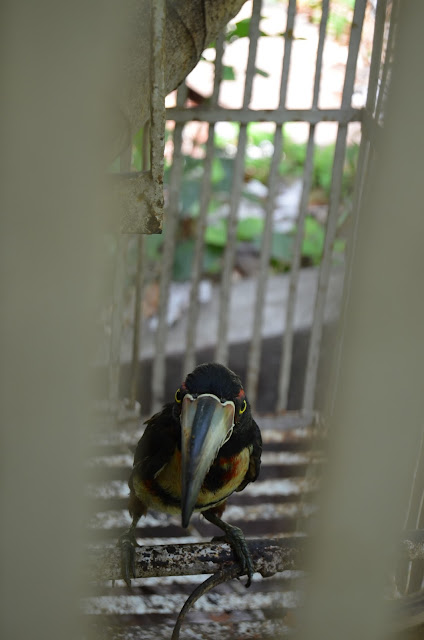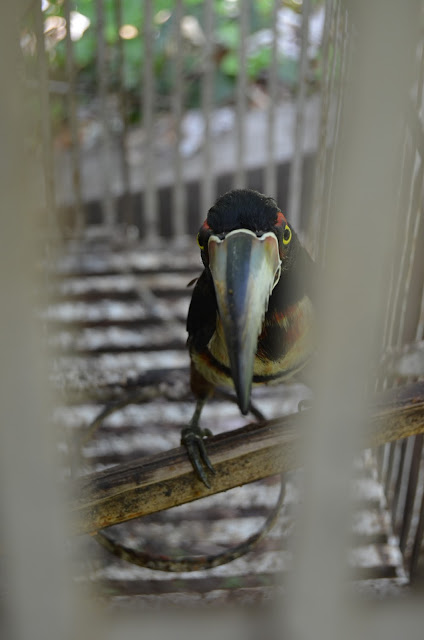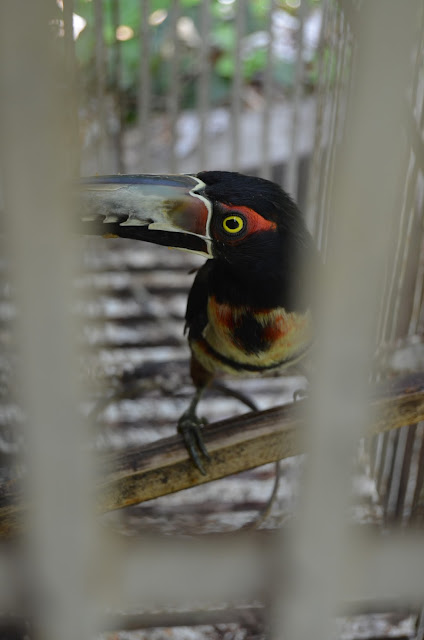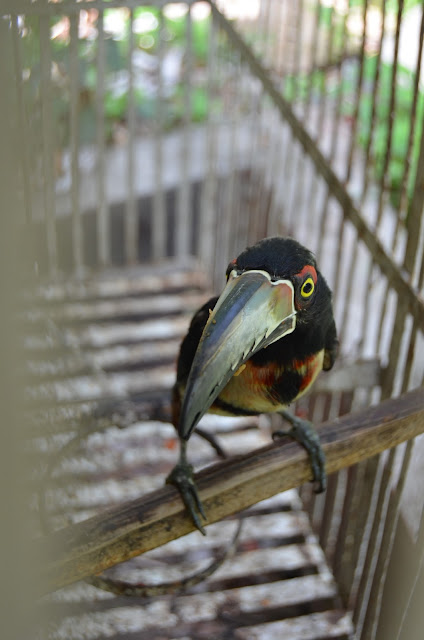We are amazed and saddened when we hear yet another story of "wild animal rescue" with an all-too common thread. The story begins with a person with a wild animal in a cage, accompanied by photography thanks to Jen Moran. Not just any type of person, however; this story begins with a person who pretends to be socially and environmentally concerned and conscious. That's the hook that makes the rest of this archetypal story so sad.
This bird is called a Collared Aracari (Pteroglossus torquatus). It is one of the two species of toucans found in Laguna de Apoyo Nature Reserve, and by far the most common. Collared Aracari tend to be seen in the forest canopy, flying about in family groups. Their diet is principally fruits, but their long bill with razor-edge sides provide toucans with an effective tool for predation. Small birds, especially chicks in the nest, can be consumed by the toucans. Their size, bright colors and substantial bill warn other birds, and they are generally feared by the smaller birds in the forest.
Those same bright colors and distinctive body that make the Collared Aracari a prominent member of the forests here, also bring its attention to its most dangerous predator: Homo sapiens. As if life in the forest is not complicated enough, toucans attract the attention of humans, who have learned that people will pay money for them. Although the Collared Aracari rarely descends to the lower levels of the forest, it is particularly vulnerable to capture, because it roosts and nests in tree cavities, where humans participating in the illegal trade in wild animals can spot them and reach them with relative ease.
Lots of birds live in accessible places, but when the birds are as spectacular as a Collared Aracari, someone is likely to follow them, learn their habits, capture them, and then sell them for money. That is where the supposedly well-meaning, well-educated and conscientious people of this world come in. Just seeing a toucan-any of the several species existing in Nicaragua-brings a state of awe to the observer. Its grace and beauty are elusive in nature, to be valued only by the hardiest and most disciplined and prepared birdwatchers. Suddenly The Discovery Channel is live and before us, when we see this bird up close. And as is often depicted on The Discovery Channel, our imagination is inspired to dream of becoming the toucan whisperer. We are all motivated by our consumer culture, to acquire what is attractive. We may go to perverse lengths to justify our desire to possess and control. Some people end up justifying the payment of money to a person engaging in illegal trafficking of wild animals, in spite of all their knowledge and perspective. It is sad to see birds like this little toucan in the pet trade, because they are obviously happier free and not in a cage.
With astonishing frequency, we are contacted by people with animals such as this one. A few people are honest about their mistake: they bought an animal that really needed to be free and not in a cage. The majority, however, try to justify their purchase of a captured and caged animal, by claiming that by purchasing the animal, they can help to rescue it. It's as if these people had never taken a simple course in economics, on the law of supply and demand. Simply put, by investing money into the supply chain for the illegal pet trade in wild animals, these supposedly well-meaning individuals empower the people who destroy the natural resource base, guaranteeing doom for this toucan's relatives.
This is where we come in at GAIA: We receive, care for, rehabilitate, and release wild animals. This process has included lots of type of animals, from monkeys to wrens, over the years. We have made a small contribution to the process of educating people about the wild animal trade, as we go along. The animals receive the best humane treatment we can give, and when appropriate, they are released where they have the best opportunity to reintegrate themselves into the wild.
Soon, this bird will return to the wild, to live and die as nature intended, free from its greatest menace. Meanwhile, we are learning from this bird, especially we are learning how misguided and destructive is the the illegal traffic in wild animals. Every day we find yet another well-educated person in Nicaragua with some monkey, parrot, or other animal that deserves to be away from the claws of humans. We tell them this practice needs to end and they need to be involved in ending it, although not everyone wants to hear such a message.
We at GAIA would like to do more, too. We have hungry mouths to feed and transport and infrastructure costs. We need your help. Your donation can provide a second chance for many animals, and help to put an end to the illegal trade in wild animals in Nicaragua. We want to build more cages and make a bigger impact. There are many animals that we can not take, because we do not have the resources to do so. You can volunteer to help us with wild animal rescue. Our animals need people to feed and clean cages, and perform repairs and maintenance on cages, and help to keep the animals happy and every day coming closer to returning to the wild. Not everyone can come and give their time, however. By making a ten-dollar donation, you can provide fresh fruit and other appropriate foods to this toucan for an entire month. By donating eighty dollars, you can provide the materials for another large enclosure which would aid in the preparation of animals for release. Please donate to GAIA for this worthy cause.
 |
| This Collared Aracari never asked to be put in a cage. Photo Jen Moran. |
 |
| It is obvious that this Collared Aracari seeks freedom! Photo Jen Moran. |
 |
| Such a majestic animal should never be forced to live in captivity. Photo Jen Moran. |
 |
| The Collared Aracari is common and prominent in Laguna de Apoyo Nature Reserve. This rescue bird daily hears the calls of his free friends. Soon, when ready, this bird will meet them up close! Photo Jen Moran. |
 |
| This is not the way to live! Wild animals should live and die in the forest, not in a cage. Photo Jen Moran. |
Soon, this bird will return to the wild, to live and die as nature intended, free from its greatest menace. Meanwhile, we are learning from this bird, especially we are learning how misguided and destructive is the the illegal traffic in wild animals. Every day we find yet another well-educated person in Nicaragua with some monkey, parrot, or other animal that deserves to be away from the claws of humans. We tell them this practice needs to end and they need to be involved in ending it, although not everyone wants to hear such a message.
We at GAIA would like to do more, too. We have hungry mouths to feed and transport and infrastructure costs. We need your help. Your donation can provide a second chance for many animals, and help to put an end to the illegal trade in wild animals in Nicaragua. We want to build more cages and make a bigger impact. There are many animals that we can not take, because we do not have the resources to do so. You can volunteer to help us with wild animal rescue. Our animals need people to feed and clean cages, and perform repairs and maintenance on cages, and help to keep the animals happy and every day coming closer to returning to the wild. Not everyone can come and give their time, however. By making a ten-dollar donation, you can provide fresh fruit and other appropriate foods to this toucan for an entire month. By donating eighty dollars, you can provide the materials for another large enclosure which would aid in the preparation of animals for release. Please donate to GAIA for this worthy cause.
 |
| Click on the "escudo" to contact us. |
No comments:
Post a Comment